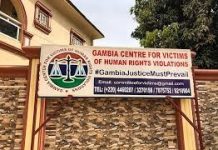The National Human Rights Commission (NHRC) has issued a stark warning regarding the recent wave of legal actions against publishers and journalists, highlighting that such moves pose a significant threat to freedom of expression in the country.
In its 2024 State of Human Rights report, the NHRC acknowledged the progress made in enhancing freedom of expression and media rights since the 2016 presidential elections. The report noted that The Gambia now ranks 74th in the Global Freedom of Expression Report and stands out as one of Africa’s top ten countries in this domain.
“However, during the reporting year, threats to take legal action against publishers and civil suits against journalists and publishers, threatened the freedom of expression space,” the rights commission lamented.
The report points to a series of events that underline the deteriorating climate for media freedom. A notable incident involved the Voice Newspaper, which published a story on September 23, 2024, alleging that President Adama Barrow had selected Muhammed Jah as his successor. This prompted an immediate response from the President’s legal team, demanding a retraction and an apology within 24 hours, or face legal repercussions.
Following this, on September 26, reporter Momodou Justice Darboe and Editor-in-Chief Musa Sheriff were summoned by police over accusations of false publication. Darboe was subsequently charged and later released on bail. In a turn of events during a meeting on November 4, 2024, with members of the Gambia Press Union and other media organizations, President Barrow agreed to drop the civil suit against the Voice Newspaper unconditionally.
The situation deteriorated further in October 2024, when journalist Kebba Ansu Manneh faced a defamation lawsuit from the Minister of Environment, Climate Change and Natural Resources, demanding 50 million Dalasi in damages. This case remains ongoing, adding to concerns raised by the Gambia Press Union.
The Gambia Press Union has vocalized its apprehension over the implications of these civil suits, warning that they could hinder freedom of expression and press freedom. In October, the GPU submitted a position paper to the National Assembly, advocating for changes to the Cybercrimes Bill, 2023, and the Criminal Offences Bill, which they argue impose unnecessary restrictions on media operations.
Despite government assurances of commitment to media law reforms, the GPU asserts that certain provisions in the Cybercrimes Bill threaten to undermine the very freedoms that have been fought for in recent years. They have called on the Ministry of Justice to review laws that could suppress free speech and urged the Attorney General to withdraw the charges against the Voice Newspaper reporter. Additionally, they implore the Minister of Environment to reconsider the defamation lawsuit against Manneh.
As The Gambia navigates its fragile landscape of media freedom, the NHRC and various journalistic bodies continue to advocate for a more conducive environment for expression, urging the government to uphold its promises and protect the rights of journalists and media organizations across the nation.




















